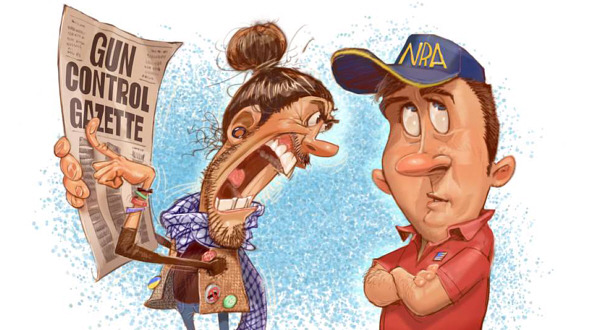

More Proof That 'Gun-Control'
Activists Just Aren't Thinking

Illustration: Gary Locke
By Charles C. W. Cooke. July 31, 2022
Article Source
At the science-news website, phys.org, Joe Arney of the University of Colorado at Boulder interviewed his colleague, Chris Vargo, about some new research into the politics of 'gun-control' that Vargo believes explains why "the U.S. public as a whole doesn't consider guns an important issue." Per Vargo, the key problem is that Americans do not think about guns for long enough to demand stricter regulation. In the wake of a mass-murder incident, he contended, the public's attention is held, but then swiftly recedes. Thus, he concluded, "public sentiment" never becomes "strong enough to pressure legislators into taking action."
It would be difficult to find a more perfect example of the core flaw within the gun-control movement's approach to politics than is provided here. Throughout the interview, both Arney and Vargo simply assume that the answer to the problem must be more 'gun control'. They assume that the only important question is why America's legislatures have not yet passed restrictions on our freedom.
In their estimation, the destination is set; what matters is how the media can build sufficient enthusiasm, anger or heartbreak to get the voters there. That the country might be filled with people who disagree with their monomania seems never to have occurred to them. To them, 'gun control' is the obvious solution, and, if it hasn't happened yet in the ways they favor, then it must be because Americans are a frivolous people who consider the criminal use of firearms to be "unimportant," who resist calls for regulation out of childish spite and who prefer to ignore the issue than consider it seriously—none of which is true.
At one point in his interview, Arney gets tantalizingly close to comprehending the flaw in Vargo's theory when he cites data showing that, after a mass-shooting, "there are spikes in Google searches for terms like 'Second Amendment rights,' 'concealed-carry permit' and 'Sandy Hook donations.'" As you will notice, two of those three examples are not, in fact, related to 'gun control', but to its opposite. If, indeed, a good number of the people who are considering the topic of firearms are searching for "concealed-carry permit" or "Second Amendment rights," then one ought not be too surprised when the result of that spike in interest is an increase in gun sales or concealed-carriers or voters who resist harsher infringements.
But, that went right over their heads. Indeed, the selective blindness of America's gun-control advocates has reached legendary levels of late. Whenever guns are debated, supporters of the Second Amendment, such as myself, are told incessantly that "nothing" has been done for years, perhaps even for decades, and that now is the time for "action." But, of course, what those who offer up this line really mean is that their preferred set of ideas has not been adopted.
Vargo finishes his interview by lamenting that we will likely "never see action at the federal level" but suggesting that it is possible, nevertheless, that we "might see local and state policies enacted to protect us." But we have seen "local and state policies enacted to protect us." They're just not the local and state policies that Vargo wants. In 2002, there was one constitutional-carry state; now there are 29.
The federal "assault-weapons" ban of 1994 is gone; many states have abolished all manner of rules that only burdened the law-abiding; the Bruen decision made "good-cause" requirements illegal across the nation and affirmed that our right to bear arms does indeed obviously extend outside of our homes. All of these changes—and many more—should not be spun to suggest that Americans do not care about firearms. All of this does explicitly say, however, that many Americans disagree with Joe Arney and Chris Vargo that their Second Amendment freedom is a problem that needs to be solved with yet more 'gun-control' restrictions.
![]()
























